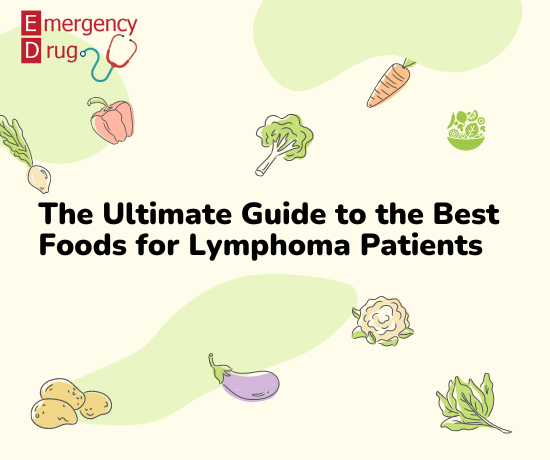The Ultimate Guide to the Best Foods for Lymphoma Patients
Hasan
09 Apr, 2023

Table of Contents
What is Lymphoma?
Lymphoma is a type of cancer that affects the lymphatic system, a network of vessels and tissues that help fight infection and disease. The lymphatic system includes the lymph nodes, bone marrow, spleen, thymus, and other tissues. Lymphomas can be either Hodgkin or non-Hodgkin and can develop in different body parts. The exact cause of lymphoma is unknown, but certain risk factors, such as a weakened immune system, exposure to radiation or chemicals, and certain infections, have been linked to its development.
Here, we can discuss on the ultimate best foods for lymphoma patients.
Types of Lymphoma
Non-Hodgkin Lymphoma – is a more diverse class of lymphatic cancers. It can form in any body area with lymphatic tissues, including lymph nodes, spleen, bone marrow, and other organs. Non-Hodgkin lymphoma has many subtypes, such as diffuse large B-cell lymphoma, follicular lymphoma, mantle cell lymphoma, and others. This is more common than Hodgkin lymphoma, accounting for roughly 85-90% of all cases.
Hodgkin Lymphoma – is a kind of cancer that affects the cells in the lymphatic system, known as Reed-Sternberg cells. The presence of a specific type of cell, the Reed-Sternberg cell, in the afflicted tissue often defines it. It is a comparably rare kind of lymphoma, accounting for only 10-15% of all cases.
The critical difference between Hodgkin lymphoma and non-Hodgkin lymphoma is the kind of cells affected and the unique features of the cancer cells. Hodgkin Lymphoma is characterized by the presence of a specific type of cell, the Reed-Sternberg cell, in the afflicted tissue.
On the other hand, Non-Hodgkin Lymphoma is a more diversified category of tumors that can affect any portion of the body where there are lymphatic tissues but does not have the characteristic Reed-Sternberg cells observed in Hodgkin lymphoma.
Another contrast is that Hodgkin lymphoma is often thought to have a better prognosis, with more excellent cure rates and more treatment choices available, compared to non-Hodgkin lymphoma, which can be more variable in its appearance and more problematic to treat.
Food Chart for Overall Fitness and Fighting Lymphoma
Living a healthy life mainly depends on your food habits. An eat well guide is crucial for health and wellbeing for everyone. In general, the ideal food chart is the same for all, whether it is a lymphoma cancer patient or not.
Some best foods for lymphoma cancer treatment include:
- Fruits and vegetables: full of vitamins, minerals, and antioxidants.
- Whole grains: Offer fiber and energy.
- Lean proteins: Including fish, chicken, beans, and tofu.
- Low-fat dairy items: for calcium and protein.
- Nuts and seeds: rich in healthy fats and nutrients.
So, eating more vegetables, fruit, berries, legumes, and whole grains is what we should do. Whereas eating fewer sweets and limiting the intake of red meat, cured meats, and alcohol is apparent. This advice is primarily for lowering cancer risk in the long term but is also suggestive after a cancer diagnosis.If you struggle with your appetite and lose weight quickly, focus on more energy and protein-rich meals, such as eggs, fish, lentils, beans, nuts, and full-fat dairy products. However, it is vital to note that food and meals are a part of life, and following an elaborate diet could negatively affect daily living.
We elaborate on the recommended food chart and how it benefits cancer treatment.
How can fruits and vegetables cure lymphoma?
In a well-balanced diet for people with lymphoma, servings of fruits and vegetables are crucial since they offer several vital nutrients, vitamins, and minerals. These vitamins and minerals boost the immune system, which is essential for lymphoma patients as the illness might impair it. Additionally, several fruits and vegetables include antioxidants, which protect cells from harm and may lessen cancer risk.However, It’s noteworthy that eating fruits and vegetables will not treat lymphoma alone. A well-balanced diet containing lean protein, healthy grains, and low-fat dairy items is suggested.

What is the value of whole grains in treating lymphoma?
Whole grains have excellent advantages for patients with lymphoma. They are high in fiber, which helps aid digestion and offers energy. Whole grains can also help maintain a healthy weight, which is essential for persons undergoing treatment for lymphoma, as weight loss and malnutrition are typical adverse effects of treatment. The recommended quantity of whole grains varies depending on age, gender, and level of physical activity. As a general guideline, the USDA recommends that at least half of the grains taken in a day should be whole grains. A 2000-calorie diet translates to around 6-8 ounces of whole grains daily.
Does lean protein aid in curing lymphoma?
Yes, lean protein can aid persons with lymphoma since it is crucial for maintaining and healing tissues, particularly muscles, and boosting the immune system. The body requires protein to operate effectively, especially during therapy for lymphoma, as the disease and its treatment can lead to muscle wasting and malnutrition. The richest sources of lean protein are fish, poultry, lean meats, beans, lentils, tofu, and dairy products such as low-fat milk and cheese.
The required quantity of protein varies depending on age, gender, and degree of physical activity. Still, an essential suggestion is to ingest 0.8 grams of protein per kilogram of body weight each day. For example, a passive lady who weighs 68 kilograms (150 pounds) requires around 55 grams of protein per day. In contrast, a passive male who weighs 77 kilos (170 pounds) needs about 62 grams of protein per day.
The benefits of low-fat dairy products for fighting lymphoma
Low-fat dairy products, like milk, cheese, and yogurt, can provide various health benefits for patients with lymphoma, including:
Protein: Low-fat dairy products are rich sources of protein that can help maintain muscle mass and improve the immune system.
Calcium: Low-fat dairy products are high in calcium, vital for strong bones, and may also have anti-cancer qualities.
Vitamin D: Low-fat dairy products are commonly fortified with vitamin D, which helps the body absorb calcium and has been associated with a lower risk of some malignancies.

Probiotics: Yogurt is a good source of probiotics, which are helpful microorganisms that can promote gut health and increase immunological function. The best sources of low-fat dairy for persons with lymphoma are:
Milk: fat-free or 1% milk
Cheese: low-fat cheese such as mozzarella or cheddar
Yogurt: plain, non-fat, or low-fat yogurt.
Saturated and trans fat for treating lymphoma
A balanced diet should limit saturated and trans fats, even for cancer patients. These fats can elevate cholesterol levels and increase the risk of heart disease and other health concerns.Animal products, such as fatty meats, butter, and whole-fat dairy products, have saturated fats and are solid at room temperature. In addition, trans fats are present in partly hydrogenated oils, which are utilized in many processed meals, including fried dishes, baked products, and snack items. For persons with lymphoma, it is suggested to restrict saturated and trans fats and to focus on suitable forms of fat, such as monounsaturated and polyunsaturated fats. These fats are found in avocados, nuts, seeds, and fatty seafood.
The American Heart Association recommends reducing saturated fat to less than 7% of daily calorie intake and avoiding trans fats as much as possible.
Liquids are mandatory
The general suggestion is to drink 1.5 to 2 liters (approximately 6 to 8 glasses) of water daily. Except for alcohol, all fluids are included. Tea and coffee contain caffeine. If your taste is altered by therapy, we have some suggestions below. It is crucial to drink enough liquids if you are losing more water from your body than average. For example, if you experience signs of lymphoma, such as sweating, or adverse effects of therapy, such as illness (vomiting) (vomiting). Drinking enough water can also assist in reducing constipation and improving urine or bladder issues.
Final Thoughts:
It is always suggested for everyone, especially those with lymphoma cancer, to check with a doctor before planning a meal based on diet and nutrition. One can also visit a certified dietitian for individualized suggestions, especially for patients with lymphoma who may have specialized dietary demands during treatment.
Read more 8 Best Foods to Fight Lymphoma Cancer
To read more visit emergency drug blog
